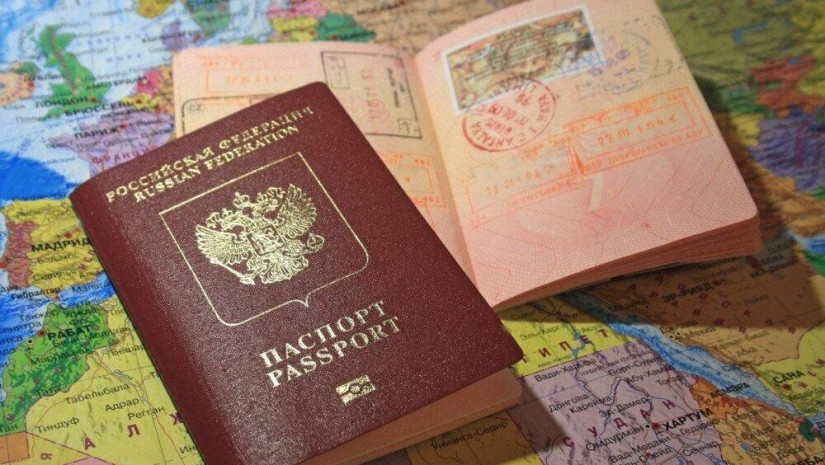Part of the Georgian society actively demands to introduce visa regime for citizens of Russia and Belarus, implying the "different", i.e. non-touristic nature of the current inflow. The petition that started to circulate with this demand gathered necessary 10 thousand signatures in a matter of several hours. Doubts of Georgian society are backed by numbers.
Georgia’s leading investment bank Galt and Taggart estimated that total international visitors stood at 387,781 persons – up 164.4% y/y and accounting for 53.3% of 2019 level, highest in two years. This growth was predominantly driven by increase in tourist arrivals recovering at 64.1% of 2019 level (up from 62.3% recovery in previous month). Recovery in same-day trips slightly accelerated, recovering at 33.3% of 2019 level (up from 28.6% recovery in previous month) reflecting gradual easing of regulations of neighboring countries.
Top country by arrivals was Russia (23.3% of total), followed by Turkey (16.0%), and Armenia (16.0%). Notably, number of visitors from Kazakhstan, Belarus and Uzbekistan surpassed 2019 levels.
As for the tourism revenues, Galt and Taggart reports that revenues stood at post-pandemic record high US$ 301.7mn in June-22, up 3.8x y/y and accounting for 88.7% of 2019 level (down from 95.6% in previous month). According to Georgia’s prominent investment bank, this tourism revenue figure captures also migrants impact (from Russia, Belarus, Ukraine), arriving in Georgia after Russia-Ukraine war started.
Russia accounted for 22.7% of tourism revenues in June-22, followed by EU countries (10.1% of total), Belarus (9.3%) and Turkey (9.3%). Galt and Taggart expect tourism revenues to recover at 85% of 2019 level in a baseline scenario, however considering strong figures in May-June and migrant impact, full recovery is also likely.
Galt and Taggart estimate, that around 80,000-120,000 visitors relocated in Georgia for longer term than regular tourists.
Political party Lelo backs the demand to impose visas on Russian citizens. According to one of its founders Badri Japaridze, 30 days should be totally enough for tourists, as it is regulated in many countries. “If a person or group of persons want to stay 360 days – this is not exactly tourism, and let us name what that is by issuing Visa” – Badri Japaridze said.
Tbilisi Mayor Kakha Kaladze responded to the Lelo's initiative. According to him, the development of the tourist direction is directly related to the strengthening of the economy, and the government will do everything to promote this direction.
What Tbilisi Mayor calls ‘strengthening of the economy’, TI Georgia calls an increased dependence on Russia.
Transparency International Georgia studied the issue of Georgia's economic dependence on Russia: The data as of June 2022, on trade between Georgia and Russia, tourists, remittances, foreign direct investments from Russia, and registration of Russian companies in Georgia was analyzed.
In January-June 2022, Georgia received about USD 1.2 billion in income from Russia through remittances, tourism, and commodity exports, which is 2.5 times more than the income received from Russia in January-June 2021 from the same sources. Moreover, this year’s receipts are 36% more than the income received from Russia before Covid-19 - in January-June 2019. This means that compared to previous years, Georgia's economic dependence on Russia has been increasing. This growth is mainly due to the soaring remittances. Exports of goods taken separately decreased.
Here are some main findings of TI Georgia:
– Only in March, April, May, and June of this year, about 6,400 Russian companies were registered in Georgia, which is 7 times more than the annual number of 2021. A total of 13,500 Russian companies are registered in Georgia, and half of them were registered after the start of the war in Ukraine;
– In January-June 2022, Georgian exports to Russia decreased by 2.8% and amounted to USD 256 million. After the start of the Russia-Ukraine war, in March-June, the export decreased by 16%, which was mainly caused by the reduced export of wine and non-alcoholic beverages;
– Traditionally, Georgia’s wine exports are highly dependent on the Russian market. In January-June 2022, USD 58 million worth of wine exported to Russia was 58% of Georgia's total wine exports;
– In January-June 2022, imports from Russia increased by 51% and amounted to USD 706 million. The share of imports from Russia was 11.9% of the total imports of Georgia, which is the highest in the last 15 years;
– After the start of the Russia-Ukraine war, the import of petroleum products (fuel) from Russia increased the most - by 280% (by USD 118 million). Electricity imports increased 4 times (by USD 9 million). Import of coal and coke increased 3 times and totaled USD 23 million;
– Despite the increase in imports, Russian electricity accounts for only 3.5% of Georgia's domestic consumption. Russia's share in the domestic consumption of natural gas in Georgia is up to 8%;
– Georgia's dependence on Russian wheat and wheat flour remains high. In January-June 2022, the share of Russian wheat and wheat flour in Georgia’s total import of these products was 95%;
– In 2022, the growth rate of the arrival of visitors from Russia accelerated significantly, and 247 thousand visitors arrived in January-June. However, compared to January-June 2019, the number of visitors from Russia is still 3 times less. In January-June 2022, the share of Russian visitors in the total number of visitors to Georgia was 15.2%, which was lower than in 2018-2019;
– In April-June 2022, remittances from Russia to Georgia increased 6.5 times and amounted to USD 678 million. The main reason for such high growth is the Russian citizens moving to Georgia, who are sending money from Russia;
– In the first quarter of 2022, direct foreign investments from Russia decreased by USD 11.2 million;
According to TI Georgia, significantly increased imports of Russian goods, remittances, and establishment of companies by Russian citizens in Georgia raise the risk that Georgia will be used to circumvent sanctions imposed on Russia. “Regardless of whether or not Georgia is used by a specific sanctioned individual or company for circumventing the sanctions, the increased economic ties mean that Russian businesses and citizens, in general, can use Georgia to escape the economic hardship created by the sanctions imposed on Russia” – the report reads.
The ruling party - Georgian Dream does not see the problem. Instead, it labels the advocates of visa regime with Russia as "xenophobs". This sentiment has been expressed by the Speaker of the Georgian Parliament, Shalva Papuashvili, as he was responding to the Transparency International Georgia's study.
"This campaign has turned into xenophobia and I am surprised that along with political parties, non-governmental organizations are involved in this. According to studies, young people with good income come to Georgia from Russia," Papuashvili said.
The Chairman of Georgian Dream Irakli Kobakhidze shares the same point of view. According to him, the number of Russians who entered Georgia during the last 6 months is less than 7% of the population and, considering the number of those who then leave Georgia, the remaining number might be even less than 1% of the population.
"If we take it as a whole, the rate of entry during these 6 months, then they leave and the balance remains a tenth of that. Even if we take the rate of entry, it is less than 7% of the total population," said Kobakhidze.
Lelo’s Badri Japaridze lacks logic behind GD’s statements. “Russia exercises visa regime on Georgians. Georgia’s citizens cannot travel to Russia without a visa. So, let me ask Kobakhidze – if Russians are xenophobic against Georgians, why Georgia should be denied to use this mechanism against the influx of Russia’s citizens? And let me remind the ruling party that this is Russia that has occupied 20% of Georgia’s territory. We are talking about the enemy here” – Japaridze stated in a BMG TV interview with Analytics with Elene Kvanchilashvili.
In July, the National Democratic Institute (NDI) published the results of its survey on sentiments in Georgian society, also considering the background of the ongoing Russian invasion of Ukraine.
According to the results, almost half of Georgians - 44% - think that the country is going in the wrong direction, 17% think that Georgia is not changing at all and 28% think that the country is going in the right direction.
The survey, which was conducted in March 2022, shows that the majority of Georgian population - 64% - still remain politically undecided and only 35% can name which political party stands closest to them. In particular, 22% of respondents named the ruling Georgian Dream party standing closest to them, 7% named the United National Movement and 6% named other parties.
According to NDI, Russia’s attack on Ukraine impacted Georgians’ visions in terms of desirable political and economic partners. As per survey, after the Russian invasion of Ukraine, EU, USA and Turkey became the most desired political and economic partners for most Georgians. At the same time, the number of supporters of the closest political and economic partnership with Russia, dropped significantly after the beginning of war - from 24% to 13% (political partnership) and from 29% to 16% (economic partnership).
Traditionally, support for EU and NATO membership remains especially high. In particular, 82% of Georgians support the country’s EU membership, while 9% oppose it. At the same time, 71% support Georgia’s NATO membership, while 15% oppose it.
Support for the Ukrainian people and their government is especially high. 98% of Georgian have favorable opinion of Ukrainian people (1% unfavorable) and 87% have favorable opinion of the government of Ukraine (8% unfavorable). Towards the Russian people and their government the results are different, however, as described by the NDI, "Georgians say #notallrussians". In particular, 59% have favorable opinion of the people of Russia (36% unfavorable) and 9% have favorable opinion of the Russian government (85% unfavorable).
Respondents were also interviewed about the possible introduction of visa regime with Russia. For reference, currently Russian citizens can enter Georgia without a visa, while Georgians are required a visa to enter Russia. The survey showed that 66% of respondents think that visa regime for Russians should be introduced, while 23% oppose this idea. However, at the same time, 49% of Georgians approve the government’s decision not to join sanctions against Russia, while 37% disapprove.
Meanwhile, the leaders of Estonia and Finland want other EU countries to stop issuing tourist visas to Russian citizens, saying they should not be able to travel to Europe on holiday while the Kremlin carries out a devastating war in Ukraine.
Estonia and Finland both border Russia and are members of the European Union, which banned air travel from Russia after it invaded Ukraine. The last remaining passenger rail link between Russia and the EU ended in March when the high-speed service between St. Petersburg and the Finnish capital Helsinki stopped running.
Finland’s Prime Minister Sanna Marin said in a TV interview that "it is not right that while Russia is waging an aggressive, brutal war of aggression in Europe, Russians can live a normal life, travel in Europe, be tourists."
A day later, Estonian Prime Minister Kaja Kallas wrote that “visiting Europe is a privilege, not a human right” and that it is “time to end tourism from Russia now”.
In response, former Russian President Dmitry Medvedev compared Kallas to a “Nazi”.
All eyes are now on EU if it takes a common stand on the issue and stop granting new visas to Russia’s citizens completely.















